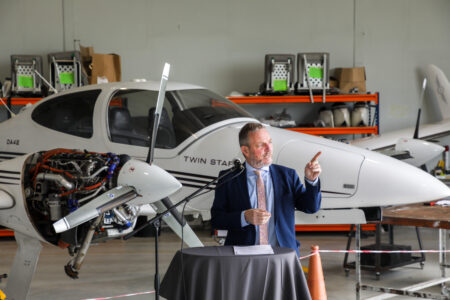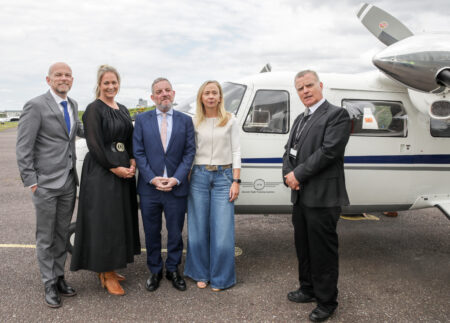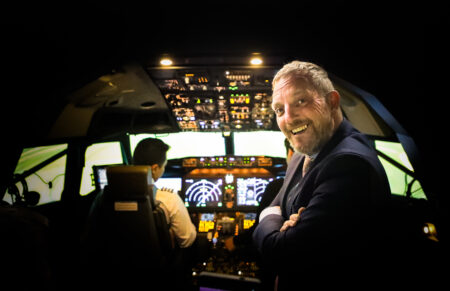13 May 2025
By Bryan McCarthy
bryan@TheCork.ie
AFTA will employ an additional 15 staff at its Cork and Waterford facilities, bringing its total headcount as an SME to 85

Minister for State at the Department of Transport Jerry Buttimer speaking at the launch of a new ‘Economic Impact Report’ on Atlantic Flight Training Academy, (AFTA), which was carried out by Dr.Pio Fenton from Munster Technological University (MTU) in partnership with AFTA in Cork. – Picture: David Creedon

Dr. Pio Fenton, MTU, Jennifer McEvoy, AFTA, Minister for State at the Department of Transport Jerry Buttimer, Dr. Rose Leahy and CEO AFTA Capt. Mark Casey pictured at the launch of a new ‘Economic Impact Report’ on Atlantic Flight Training Academy, (AFTA), which was carried out by Dr.Pio Fenton from Munster Technological University (MTU) in partnership with AFTA in Cork. – Picture: David Creedon
Atlantic Flight Training Academy (AFTA) recently celebrated its 30 year Business Anniversary operating at Cork and Waterford airport’s and since its foundation the Enterprise Ireland client firm has played a vital role in the global aviation industry, supplying 2,800 highly skilled) commercial pilots to leading airlines and operators worldwide since 1995.
A new ‘Economic & Social Impact Report’ on Atlantic Flight Training Academy, (AFTA), published today, which was researched and authored by Dr.Pio Fenton from Munster Technological University (MTU) in partnership with AFTA, shows that Cork headquartered AFTA has made a significant economic contribution to the regional economy in Munster, generating €35m per annum for Cork and Waterford, as well as supporting growth across the entire Munster region, through job creation, tourism development, international (airline) partnerships, investment in sustainable aviation, as well as, having positive social and cultural benefits for the wider community.
AFTA was founded by Captain Mark Casey (CEO) in March 1995 on a clear mission to provide the highest quality of pilot training while upholding the values of professionalism, innovation and safety. AFTA’s early cadet’s received their pilot training at Cork Airport in one twin-engined aircraft and 30 years on from these modest beginning’s Atlantic Flight Training Academy has since trained an impressive roll-call of over two thousand – eight hundred (2,800) Pilots, expanded its training fleet to twenty-six, (26) state of the art training aircraft, and invested in multiple flight simulators, including the state-of-the-art Boeing 737NG and Boeing 737 Max simulators, as well as, three survey aircraft. AFTA has embarked on an ambitious programme to convert its training aircraft fleet to run on Sustainable Aviation Fuel, which will reduce its CO2 emissions by over 80%.
The Atlantic Flight Training Academy ‘Economic & Social Impact’ Report, published today in partnership with MTU, quantifies AFTA’s economic contribution to Cork and across the Munster regional economy, based on its direct, indirect and induced effects. The research analysis carried out by Munster Technological University (MTU) presents a €35 million per annum impact emanating from AFTA’s activities. This is composed of a direct impact of €22 million and indirect impact of €13 million.
Direct impact represents the immediate spending by the flight school, including salaries, VAT contributions, and regionally sourced direct operational costs.
Indirect impact arises from the flight school’s engagement with local suppliers and service providers, spending on goods and services, economic stimulation through supply chain activities, increased business for industries such as aircraft maintenance, long-term accommodation providers and fuel suppliers.
Induced impact captures the wider ripple effect generated by wages and salaries, as well as spending by students and visitors, including spending by International students and their visiting family members, contributing to Tourism and Hospitality sectors, as well as cost of living expenses for students attending AFTA.
Speaking at the launch of The MTU researched Economic & Social Impact Report, in partnership with AFTA, Minister of State for Transport, Jerry Buttimer, T.D – commented:
“As a Corkman and Minister of State at the Department of Transport, I am impressed to see that AFTA’s operations, from pilot training and aircraft maintenance to fuel supply, are deeply embedded in Cork, as well as across the Munster regional economy, with a significant reliance on local and national suppliers to sustain its world class facilities and creating local jobs for our communities in Cork and Waterford.
I understand that this year alone AFTA will employ an additional 15 staff at its Cork and Waterford facilities, bringing its total headcount as an SME to 85.
I can’t overemphasise the importance of this government’s support for SMEs. SMEs are the back-bone of our economy. Congratulations to AFTA and Captain Mark Casey on 30 years in business, and thank you to Cork Airport and Waterford Airport for their continued support for AFTA. Without our collective continued support for AFTA, Ireland inc. would not have a critical supply line of pilots for our airline industry. As an Island nation we sometimes take for granted the amazing connectivity we enjoy.”
Dr. Pio Fenton, author of The AFTA Economic Impact Report said:
“AFTA is a complex business that operates in an intricate ecosystem across the region and beyond. Its impact locally is significant in a number of ways; firstly it is a world-class flight school and it meets the need of aspiring Irish pilots in undertaking their chosen profession while in Ireland. Secondly, given its exceptional industry links, AFTA acts as a magnet for attracting overseas talent to the region. The economic impact of each of these is significant.
Presenting the highlights of the Economic Impact Report on AFTA, Dr. Pio Fenton, said:
AFTA is at the heart of a complex supply chain that requires a carefully crafted mixture of people, technology and commodity. As a relatively large employer in the SME context, it has a strong direct impact through salary and other factors of €22 million. It’s indirect impact is approximately €1 million with a significant induced impact of €11 million. This latter figure is a result of economic activity resulting from strong international student base. There is a further visitor spend impact of just under €1 million.”
Commenting on the – AFTA Economic Impact Report, Captain Mark Casey, AFTA Founder, CEO and Head of Training, said:
“This Economic & Social Impact Report, produced in partnership with Munster Technological University, isn’t just about numbers — although the numbers are impressive. It’s a record of what can happen when education, industry, and community work together. I want to give a special thank you to MTU and in particular, Dr. Fenton, who played an instrumental role in bringing this report to life.
We’ve had the privilege of working alongside some of the biggest names in aviation — Ryanair, Air Astana, VistaJet, ASL, GlobeAir, Turkish Airlines, Pegasus and many others. These are partnerships built on trust, and we’re proud to continue growing with each of them. But equally, we’ve stayed rooted in Munster. Our relationship with Cork and Waterford Airports, our commitment to local talent, and our belief in this region as a centre for excellence has never wavered.
As we look ahead to the next 30 years, we’re not resting on our achievements. Aviation is changing rapidly — new technologies, new fuels, new global challenges. But at the heart of it all, we still need people who are passionate, capable, and resilient. Our job is to prepare our cadets — not just to fly aircraft, but to lead, to adapt, and to shape the future of this industry.”

Minister for State at the Department of Transport Jerry Buttimer pictured in the cockpit of a boeing 737-800 simulator at the launch of a new ‘Economic Impact Report’ on Atlantic Flight Training Academy, (AFTA), which was carried out by Dr.Pio Fenton from Munster Technological University (MTU) in partnership with AFTA in Cork. – Picture: David Creedon
